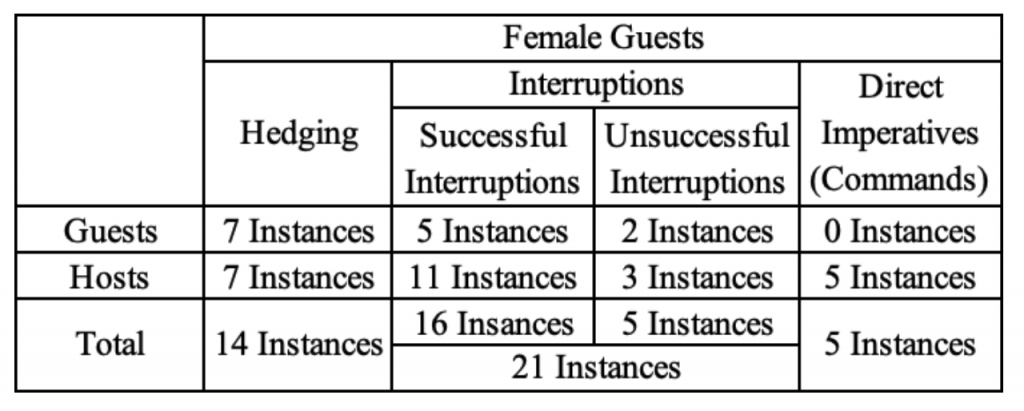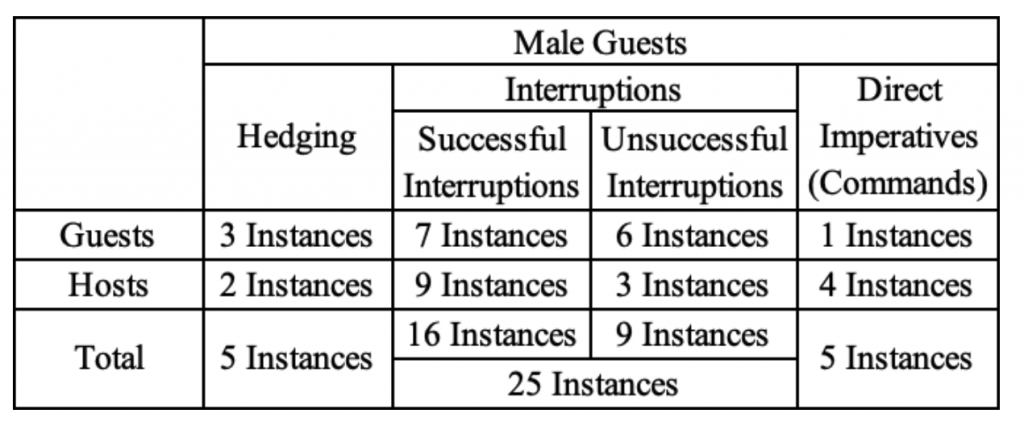Evan Yong
Videos of celebrity interviews on the show “Conan” are analyzed to see whether female guest interviews or male guest interviews have more authoritative language. In this study, authoritative language is broken down into three components: interruptions, commands, and hedging. Hedging occurs when a speaker is trying to convey uncertainty or ambiguity by using tag questions or phrases such as “kind of,” “sort of,” or “I guess.” For each and every interview, I count the number of times the celebrities and Conan interrupt each other, the number of times they give commands to each other, as well as the number of times they hedged their sentences. Results show that overall, there is more authoritative language used in Conan interviews with male celebrities than female celebrities. The male guest star interviews with Conan have more interruptions and commands as well as less hedging than the female guest star interviews. Men appear to be more “in competition” with other men, more so than with women. In today’s modern-day society, this is characterized by fighting over control of the floor to establish linguistic dominance in a conversation.
Don’t men seem to have their own language when they talk to other? It is most definitely characteristically different from the way they talk to women. Aside from the trite but quintessential stereotype of guys calling each other “dudes” or “bros,” they also appear to use harsher language when speaking to one of their own. There seems to be a universal preconceived notion that this is the way a man must act with other men; little boys were raised and taught to embody certain traditionalistic masculine behaviors growing up, such as the way they should talk to members of same as well as opposite sex. A study conducted by Yokoyama (1999) on Russian children’s literature found that even the texts in children’s books were rife with these stereotypes that men have to be strong and women are inherently weak. The gender stereotypes were even represented in the way male and female characters talk in the books. Female characters are nine times more likely to speak with diminutives and interjections compared to male characters (Yokoyama, 1999), giving the impression that they “softer,” “cuter,” more polite, as well as more easily confused than male characters.
These are the types of books that we commonly get for our developing young children. Apparently, these textually-represented gender stereotypes are prevalent from nursery books all the way to preschool level texts (Yokoyama, 1999). Children are able to differentiate between the two sexes and their associated activities (i.e. boys play with toy soldiers and girls play with dolls) from as young as 2 years old (Thompson, 1975). Because of this, Yokoyama (1999) argues that these children’s books can most definitely influence the way children grow up and how they come to think of the two genders as they develop into mature adults.
Fortunately, this may not be the case. A recent study conducted by Park et al. (2016) claims that based on their Facebook posts, women are just as assertive as men are. The study found women to be warmer, politer, and have more compassion than men, but are just as assertive. It would appear that, based on people’s online behavior, they did not grow up to fulfill the traditionalistic stereotypes imposed on them as children.
The study conducted here today hopes to solidify and support Park at al.’s (2016) findings that women are just as assertive as men by analyzing the language used in internet videos. Internet videos are arguably the most accessible and popular form of media being used today. Just imagine the possible implications of sexist overtones being present in the viral videos young children around the globe watch during recess in the playground, quietly influencing their views on the world. My focus today is specifically on Conan celebrity interviews on the TeamCoco channel on YouTube. “Conan” is a late-night TV talk show that airs on TBS but also has clips frequently uploaded to their YouTube channel. It is hosted by comedian Conan O’Brien and “sidekick” Andy Richter.
I analyzed the differences in authoritative language between Conan interviews with male celebrities and female celebrities. I divided authoritative language into three subsections: hedging, interruptions, and commands. Hedging is a linguistic phenomenon that occurs whenever a speaker is trying convey uncertainty or ambiguity. A common example of this is by adding the phrases “I guess” or “kind of” to sentences. Another is by adding tag questions to the end of sentences like, “You’re John, aren’t you?” Hedging would be an example of unauthoritative language. Interruptions is further divided into two more subsections: successful interruptions and unsuccessful interruptions. A successful interruption is when someone successfully interjects and the other person stops talking. An unsuccessful interruption is when someone interjects but the other person continues talking and so the first person who initially interrupted stops talking. Commands is anytime anybody in the interview tells another person to do something using a direct imperative like, “Tell us about your day,” or “Stop it!” Any commands addressed to the live studio audience were not counted into the results of this study. Interruptions and commands would be considered examples of authoritative language. A combination of low instances of hedging and high instances of interruptions and commands would mean a high “score” for overall authoritative language.


Based on the tables above, it is quite clear that male celebrity interviews had far more instances of overall authoritative language than female celebrity interviews; male celebrity interviews had more instances interruptions and commands as well as far less instances of hedging. It would appear that the hosts (both men) appear to use different types of language when speaking with male celebrities than with female celebrities. This is not consistent with the results from Park et al. (2016) that women were just as assertive as men. In the context of celebrity interviews, the female celebrity Conan interviews had far less authoritative language used than the male celebrity Conan interviews. Moreover, the hosts consistently hedged more in the female celebrity interviews than they did in the male celebrity interviews. This further solidifies and supports the idea that men do indeed talk differently with other men than with women.
It would seem that we as a society have not quite reached the level of progressiveness as we had hoped and that traditionalistic stereotypes still haunt our subconscious biases to this very day. The frightening takeaway from this study is that these effects were observed after only analyzing two hours’ worth of Conan footage. If we were to assume that these Conan celebrity interviews accurately represented and reflected the entire population of internet videos, it would indeed be a dangerous and unnerving precedent. Almost every young child in the Western hemisphere carries around a smartphone around with them and with that, internet access. Should you choose to believe Yokoyama (1999), these viral videos that your kids are watching everyday are casually and subconsciously influencing the way they think, particularly on their beliefs and opinions on the two sexes, based on the subtle linguistic differences that occur between the men and women in those videos. The language used in these videos, and consequently the beliefs that come along with it, will be emulated by our future generations unless we decide to make a change, now and today.
References
Park, G., Yaden, D. B., Schwartz, H. A., Kern, M. L., Eichstaedt, J. C., Kosinski, M., … & Seligman, M. E. (2016). Women are warmer but no less assertive than men: Gender and language on Facebook. PloS one, 11(5).
Thompson, S. K. (1975). Gender labels and early sex role development. Child Development, 339-347.
Yokoyama, O. T. (1999). Gender linguistic analysis of Russian children’s literature. PRAGMATICS AND BEYOND NEW SERIES, 57-84.
One cannot compare data gathered from Tweets, sent primarily by members of the general population speaking their mind, with data from interviews where the guest was a celebrity and the host was the same person each time. Those are two very different contexts, and the latter is far less generalisable.